
Ibogaine therapy, initially explored for addiction treatment, is now being examined for its potential application in managing Alzheimer’s disease. Alzheimer’s is a progressive neurodegenerative disorder characterized by memory loss, cognitive decline, and behavioral changes. Ibogaine, a psychoactive compound derived from the African iboga plant, has been the subject of recent research for its possible effects on brain function and neuroplasticity. Although research is still in its nascent stages, early findings suggest that ibogaine therapy may offer novel benefits for individuals with Alzheimer’s, potentially influencing cognitive function and overall brain health.
Ibogaine therapy involves the administration of ibogaine, a potent psychoactive substance, under controlled medical supervision. Ibogaine induces intense altered states of consciousness, which may lead to therapeutic insights and neurological benefits. In the context of Alzheimer’s disease, ibogaine therapy is being investigated for its potential to enhance brain function, stimulate neuroplasticity, and provide symptomatic relief. The therapy is administered in a medical setting, with careful monitoring due to the profound nature of the experience and its effects on the brain and body.
|
Symptom Management: Ibogaine could potentially help manage some symptoms of Alzheimer’s, such as agitation, mood swings, or behavioral changes, by modulating brain chemistry and emotional regulation. Neuroprotective Effects: There is some evidence suggesting that ibogaine may have neuroprotective properties, potentially helping to preserve brain function and slow the progression of Alzheimer’s disease. Neuroplasticity Enhancement: Ibogaine may stimulate neuroplasticity, the brain's ability to reorganize itself by forming new neural connections, which could be beneficial in counteracting cognitive decline. Cognitive Function Improvement: Early research suggests that ibogaine might positively impact cognitive functions such as memory and learning by influencing neurotransmitter systems and brain activity. |
|
Neuroprotection: Possible preservation of brain function and slowing of Alzheimer’s progression through neuroprotective effects. Holistic Approach: Combining ibogaine therapy with traditional Alzheimer’s treatments might offer a more comprehensive approach to managing the condition. Improved Cognitive Function: Possible enhancement of memory, learning, and other cognitive abilities affected by Alzheimer’s. Enhanced Neuroplasticity: Support in promoting brain plasticity, which may aid in compensating for cognitive deficits. Reduced Symptom Severity: Potential alleviation of certain Alzheimer’s symptoms, such as agitation or mood swings. |
|
Early-Stage Alzheimer’s Patients: Individuals in the early stages of Alzheimer’s who are seeking novel approaches to manage cognitive decline and enhance brain function. Patients Seeking Alternative Therapies: Those looking for alternative or complementary treatments alongside conventional Alzheimer’s care. Individuals with Cognitive Impairment: People experiencing cognitive impairment who are interested in exploring new therapeutic options for symptom management. Caregivers and Families: Families and caregivers seeking additional support and therapeutic options to improve the quality of life for their loved ones with Alzheimer’s. |
|
Best Addiction Treatment Centers and Doctors Worldwide |
|
|
Top Addiction Treatment Packages Worldwide |
|
|
Country |
Average Cost (USD) |
|
Mexico |
$7,200 |
|
Costa Rica |
$7,750 |
|
Medical Evaluation: Obtain a thorough evaluation from a healthcare professional to assess the suitability of ibogaine therapy for your condition and current treatment plan. Potential Interactions: Discuss potential interactions between ibogaine and existing medications or treatments with your healthcare provider. Treatment Preparation: Understand the therapy process, potential side effects, and the nature of the therapeutic experience before proceeding. Legal and Safety Considerations: Verify the legal status of ibogaine in your location and ensure that the clinic adheres to ethical and safety guidelines. Integration Support: Ensure that the clinic provides support for integrating the benefits and insights gained from the therapy into daily life and ongoing Alzheimer’s management. |
PlacidWay Medical Tourism can help you connect with top-rated clinics and experienced professionals specializing in this innovative approach. Get FREE QUOTE NOW and find a treatment plan tailored to your needs. PlacidWay will guide you on your journey to improved cognitive health and quality of life, providing the support and resources necessary for a successful therapeutic experience.